
views
Figure out why you made the mistake.

Think back to the moment of the mistake to determine the cause. Mistakes don't happen in a vacuum. If you know why the mistake was made, you can correct the problem so that it's less likely to happen again. This takes some tough mental work, but it's part of the process of learning from mistakes. For example, suppose you made several careless mistakes on your math homework. Looking back, you might realize that you were rushing to finish your homework because there was a show you wanted to watch on TV. Rushing through your homework is the probable cause of your mistakes. Remind yourself that failure isn't a bad thing. Mistakes can help you grow and become better at what you do.
Keep track of patterns with mistakes.
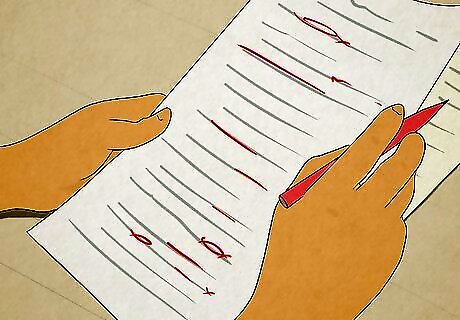
Look for patterns so you can prioritize issues you need to address. Try not to be too hard on yourself—nobody's perfect and mistakes are a normal part of life. It can be tough to remember that, though, when you seem to keep making the same type of mistake over and over. But if you're able to identify the pattern, you can break the cycle. For example, if you find that you make more mistakes after working for an hour, you might want to build in short breaks so that you aren't working that long. Breaks help keep your mind fresh and make it easier to focus.
Prepare for tasks.
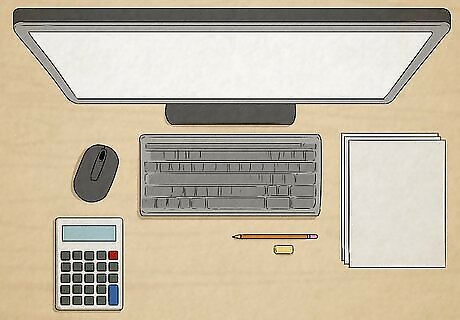
Get everything you need together before you start on something. You'll make fewer mistakes if you have everything you need close by. Take a few minutes to gather your tools or materials ahead of time. When you get started, you'll be able to focus completely on the task at hand rather than having to stop and look around for something you need. If you have to go find things after you've already started the task, it can take you that much longer to get back into the swing of things once you return. Too many interruptions and you might find yourself rushing through the job, which leads to an even greater risk of making mistakes.
Slow down.

Give yourself enough time so you don't have to rush. If you leave something to the last minute, you'll be under pressure to get it done. The stress and tension of that pressure leads to mistakes, as does the tendency to cut corners so you can meet your deadline. Be patient with yourself—it's okay if it takes you longer than it takes someone else, or if it ends up taking longer than you thought. It'll still take less time if you do it right the first time as opposed to having to fix a bunch of mistakes after the fact. Sometimes it's hard to figure out how much time you need to complete a task—especially if it's something you've never done before. Just give it your best guesstimate, then multiply that amount of time by 1.5 to make sure.
Leave time to double-check.

Go over what you've done so you can correct any mistakes you might have made. Whether it's a household chore, a homework assignment, or a work project, always review your work when you think you're done. This gives you the opportunity to catch any mistakes and fix them before they cause bigger issues. For example, if you're writing a report, leave time to go through it carefully and proofread for any typos or grammatical errors. You might also have a friend or family member look it over—a fresh set of eyes can catch a mistake you might miss.
Stay in the moment.

Act mindfully rather than allowing your mind to drift. If you keep your mind focused on the task at hand rather than allowing it to wander off, you'll often find that a lot of those careless mistakes become a thing of the past. This can take some practice, so start small and work your way up to bigger things. To help yourself be more present, try a short meditation where you focus all your attention on each sense for 1 minute. What are you seeing, hearing, tasting, smelling, and feeling? Do this whenever you feel your mind drifting to bring it back in touch with your surroundings. You're most likely to make careless mistakes when you're doing something you've done a thousand times that you don't need to think about doing. Because you're not paying attention, it's easy to miss something—but practicing mindfulness can help.
Do one thing at a time.

You'll make fewer mistakes if you don't multi-task. It may seem like you're getting a lot done, but you'll get more done with fewer mistakes if you give your full attention to one task at a time. Having to constantly switch gears as you move from one thing to another is a good way to make mistakes you could have avoided if you'd just focused. The only things you can successfully multi-task are things that you can set and forget. For example, you can do something else while you're doing the laundry because you don't have to do anything while the machine does the work. Just don't forget to take it out when it's done!
Make checklists and to-do lists.
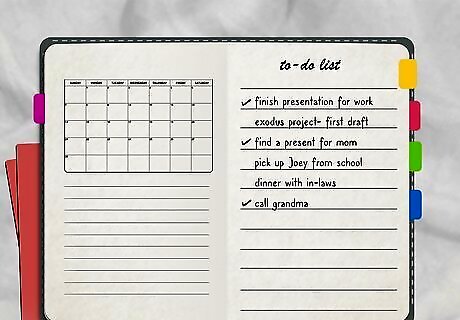
Use lists to get rid of mental clutter. If you're trying to remember a dozen things, your mind isn't focusing on the task at hand and a careless mistake is more likely. Get in the habit of writing things down and you'll free your mind to concentrate better. You might also get in the habit of making a to-do list each day, either first thing in the morning or before you go to bed at night (for the next day). This can help you organize your day better so you aren't leaving things to the last minute.
Prioritize your tasks each day.
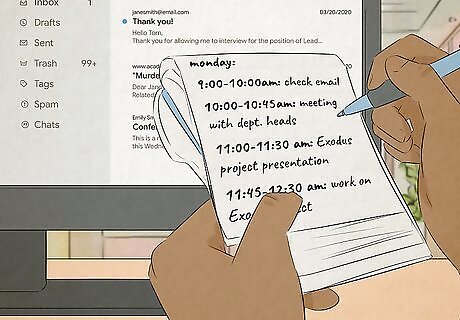
Do important and complex tasks first when your mind is fresh. Look at what you have to do each day and put them in order of priority. This could mean things that are more important for you to get done, or it could be things that are more difficult for you to get done. If you get those out of the way when you have the most energy, you'll be less likely to make mistakes. For example, if you have a hard time making phone calls and you have 2 phone calls you have to make, try to do them first thing in the morning and get them out of the way. Check in on your energy level at different times of the day and keep a log so you can figure out when you tend to have the most energy. Do complex tasks during those times to lessen the risk of making mistakes.
Set reminders on your phone.
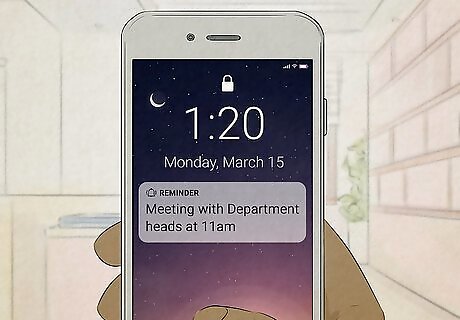
Prompt yourself to do things you frequently forget. This tactic works best if you find yourself frequently forgetting routine things, such as running out of gas. A recurring reminder to check the status enables you to take preventive action. It's best to do this as soon as possible after you've made the mistake and it's still fresh in your mind. Otherwise, you might forget to set your reminder! For example, suppose you're late to work one morning because you forgot to get gas the day before. Create a reminder that prompts you to check your gas gauge and see if you need to get gas on your way home from work, then set it to go off each afternoon about the time you're leaving work.
Use a calendar for time-sensitive events.
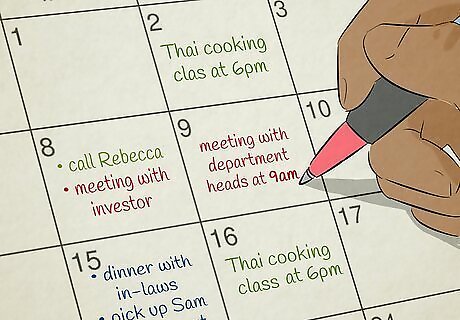
Schedule everything that needs to be done at a certain date and time. Keeping a single master calendar is a good way to make sure you know what needs to be done each day and where you need to be. It will also keep you from forgetting events and commitments you've made. Even if you have a separate calendar for work, it's still worth your while to add all those items to your master calendar. You can color-code things for work using a different color ink than you use for personal commitments. If you use a digital calendar on your computer or smartphone, you can also set reminders that will help you keep track of your appointments.



















Comments
0 comment